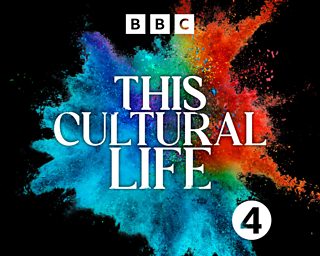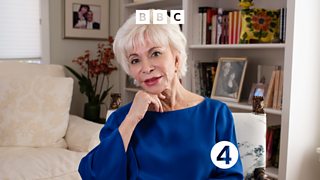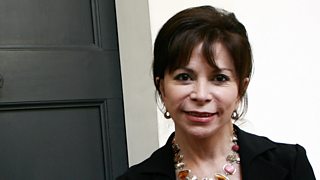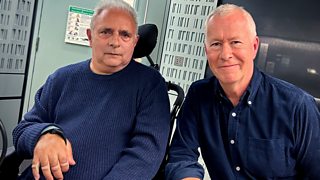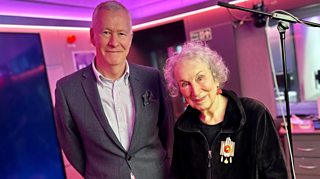Isabel Allende: Eight things we learned from her This Cultural Life interview
Chilean-American writer Isabel Allende is one of the world’s most widely read Spanish language authors. Released in 1982, her debut novel, The House of the Spirits, was an instant bestseller. She’s gone on to write another 26 novels, selling over 77 million worldwide, with her work translated into 42 languages.
On This Cultural Life, Allende tells John Wilson about her dramatic early life in Chile, the devastation of losing her daughter, and her best advice for writers. Here are eight things we learned.
1. She found her love of reading in secret
Isabel Allende was born in Peru, in 1942, and raised in Chile. She says she was “raised with stories. There was no television in Chile at the time, and we didn’t go to the movies. People sat around and had a cup of tea and they would talk and tell stories.”
Allende’s father walked out when she was very young, but left behind something that fed his daughter’s love of books. “There was a metallic green trunk, with the initials TA… Tomás Allende. Inside, it was full of young adult books: Jack London, Oscar Wilde, [George] Bernard Shaw, [Emilio] Salgari. It was a treasure, but because it belonged to my father, I thought it was forbidden. We never mentioned my father, ever. So I thought there was something forbidden about those books and the trunk, and I read the books in the basement with a candle.”
2. She only saw her father once, when he was already dead
Asked if she ever met her father, Allende says, “No, I only saw him once. He died in the street of a heart attack, and I was called to identify the body. I couldn’t, because I had never seen a picture of him. When I was in the morgue, my stepfather came and he recognised him. He said, ‘He’s your father. Look at him…’ The only time. The only contact.”
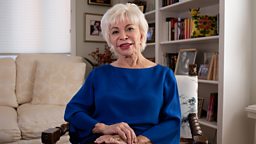
3. Her first novel started as a letter
Allende was largely raised by her grandfather, who would tell stories every day, over tea. She says he “instilled in me all the things I have been able to use in my life to survive: strength, discipline, tenacity”. When her grandfather was dying, Allende began writing him a letter.
I didn’t have to invent much with these lunatic relatives.Isabel Allende
“I started writing to tell him that he could go in peace,” she says, “that I remembered everything he told me over those infinite cups of tea and talking.” She began to recount the things she remembered, including a story of her grandfather’s first fiancée. “In a matter of two pages… it didn’t look like a letter anymore. I knew I had started something different. And I kept going, knowing my grandfather was never going to read it.”
The “letter” grew into her first novel, The House of the Spirits – an epic tale of four generations of a family, inspired by her own. “I didn’t have to invent much with these lunatic relatives.”
4. She left Chile in the coup of 1973
In 1973, the Chilean government was overthrown in a military coup, which saw General Pinochet take power for 17 years. The ousted president, Salvador Allende, was Isabel Allende’s father’s cousin.
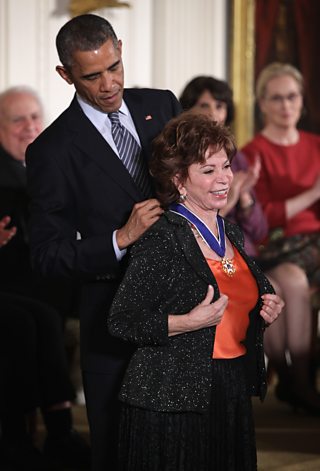
Working for a left-wing newspaper at the time, Allende didn’t realise how dangerous her situation was. “I didn’t think I was in danger because we didn’t know how these things worked,” she says. “I was fired from everywhere… I thought if I kept a low profile… sooner or later the military would go back to their barracks and we would have democracy again. Chile was known for democracy. Then things got really bad and I had to leave.” She didn’t return for 13 years.
5. Writing about her daughter’s death helped her deal with tragedy
Allende’s daughter, Paula, died in 1992 aged only 29, after suddenly becoming ill and falling into a coma for a year. A month after Paula died, Allende began writing about her. The book, Paula, came out in 1994. “It was cathartic in the sense that I could give some order to what had happened,” says Allende. “It had invaded everything. Sorrow, mourning, death, illness had occupied me completely… Writing the book allowed me to frame this tragedy somehow, so that I could contain it.”
6. Her daughter wrote a letter predicting her own death
When she was 28 – on her honeymoon, months before she became ill – Paula wrote a letter. “The letter talks of her already as a spirit,” says Allende. “She says, ‘We, the spirits, will accompany you if you are content and happy.’ It’s like a spiritual will, in a way. Why would a 28-year-old girl on her honeymoon wake up and write such a letter? The dream must have been a premonition… The letter was not for me. It didn’t say for whom. It said, ‘To be opened when I die.’ Not if I die… The tone was of someone who had completely accepted the fact she’ll die and she will die soon.”
7. She writes fiction in Spanish, non-fiction in English
Allende has lived in America for many years and says it’s changed her writing: “I think my way of writing is simpler because I live in English. I live in the United States, so all the baroque style of the Spanish language, I don’t have it in my ear all the time.” But she still writes in Spanish, mostly. “I write always in Spanish when it’s fiction. When it’s non-fiction, I have texts in Spanish and English and I work on both simultaneously.”
8. Her best writing advice is to just get started
Lose the fear of the blank screen or the blank page.Isabel Allende
Asked the best advice she’s ever been given, Allende says it was her agent telling her, “Don’t quit your day job until you are able to make a living." But her best advice for aspiring writers is, “Lose the fear of the blank screen or the blank page. If we think we’re going to write the great novel in one sitting, it’s never going to happen. You’re never going to get started. But if you think, ‘I’m just going to write anything – a bad novel – and then I’ll fix it on the way,’ you can always edit a bad page. You cannot edit a blank page.”
More from ÃÛÑ¿´«Ã½ Radio 4
-
![]()
This Cultural Life: Isabel Allende
Listen to the full interview on ÃÛÑ¿´«Ã½ Sounds.
-
![]()
Desert Island Discs: Isabel Allende
Sue Lawley's castaway is novelist Isabel Allende
-
![]()
Hanif Kureishi: Nine things we learned from his interview on This Cultural Life
The hugely respected writer talks about his life-changing accident and recovery.
-
![]()
Margaret Atwood: Nine things we learned from her This Cultural Life interview
The Handmaid's Tale author talks about her fascination with dictators.
